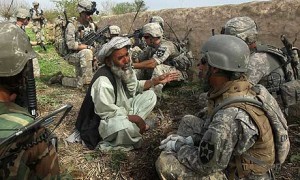Afghanistan and the US at odds over troop deployment
Friday, April 13th, 2012 6:02:29 by Ammar Ahmad
Afghanistan and the US at odds over troop deployment
Washington and Kabul have hailed breakthroughs towards signing a treaty on relations after 2014 — but it will not cover the crucial issue of the status of any US troops remaining in Afghanistan.
“Anything having to do with the continued presence of US forces and the roles that they will play will be negotiated separately after the strategic partnership agreement,” US embassy spokesman Gavin Sundwall told AFP.
In Iraq, Washington pulled out all its troops, leaving no residual force, after failing to get Baghdad to grant its soldiers immunity from prosecution in local courts.
In Afghanistan, anger over the murderous rampage last month by a US soldier who allegedly killed 17 Afghan villagers in their homes at night before being flown out of the country, has complicated the negotiations ahead.
The 130,000-strong US-led NATO force helping the Afghan government fight a decade-long Taliban insurgency is due to end combat operations and pull out by the end of 2014, but a residual US force is expected to remain.
The issue of legal immunity for those troops “is definitely one of the issues, among many others, that will be discussed with the Americans”, a senior Afghan government official told AFP on condition of anonymity.
He pointed out that last year a loya jirga — a traditional grand assembly of tribal chiefs — demanded that American troops should be liable to prosecution in local courts.
But the issue has not loomed large — at least publicly — in the Afghan negotiations so far, with Kabul concentrating on getting control over the US-run Bagram prison and controversial special forces night raids against Taliban insurgents.
President Hamid Karzai achieved both those aims over the past month, and officials on both sides have expressed hope that the strategic partnership agreement could be signed ahead of the Nato summit in Chicago in May.
That deal would cover long-term cooperation in four areas: social and economic development, institution building, regional cooperation and security, Sundwall said.
Once the special partnership is in place, several other issues would be dealt with “in separate agreements — and one of them is the status, numbers and roles of any US forces” that remain in the country, he said.
There might be little room for negotiation on the issue of immunity.
“I think it is unimaginable that the Americans would compromise on this and allow their people to be put through Afghan courts if they are accused of crimes,” said Kate Clark of the Afghanistan Analysts’ Network.
“I think with the (agreements) on Bagram and on night raids we saw the US conceding a lot of ground to the Afghan government, but I cannot see them compromising on this,” she told AFP.
Tags: Afghanistan, NATO, TalibanShort URL: https://www.newspakistan.pk/?p=18883

















